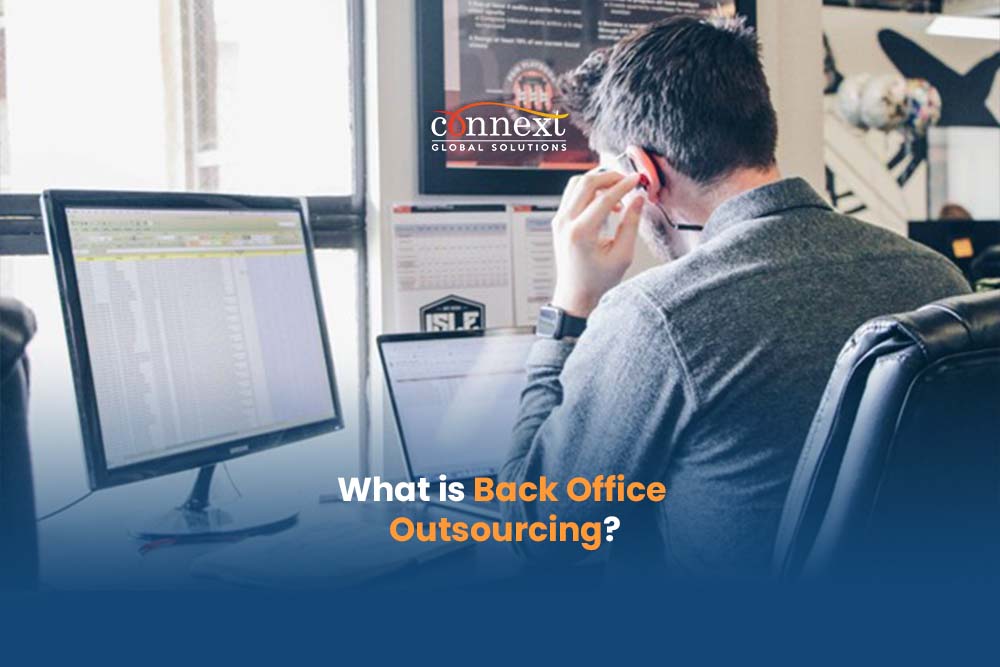The article aims to discuss back office outsourcing.
In today’s business climate, managing your company’s paperwork and maintaining its databases can become a daunting task.
With the introduction of numerous state and federal legislation as well as the ever-changing industry standards, it’s easy for small businesses to lose control of essential processes like invoicing or human resources management. Back-office outsourcing solves this problem.

What is back office outsourcing?
Back office outsourcing is the practice of companies outsourcing their back-office operations to a third-party service provider. The back office is responsible for functions vital to the operation of a company; however, this function does not include direct contact with consumers. These functions include accounting and finance management, human resources, payroll processing, customer support, and bookkeeping.
Back office outsourcing is a cost-effective solution for many companies as it does not involve moving jobs overseas or importing foreign workers into your own country. Instead, it involves sending the tasks to a different location using software, teleconferencing, and emailing documents back and forth instead of having everyone report to the same physical site every day.
Aside from reducing overhead costs associated with maintaining an office space with high rent prices, this type of arrangement also allows you greater flexibility when hiring new employees because there’s no need for them all to be located together at one time: You can hire someone remotely based on their qualifications alone without worrying about whether they’ll be able to commute daily as long as they meet all requirements necessary for success within your company.
What are the different types of back-office operations and services?
As previously stated, the back office is responsible for functions vital to the operations of a company but does not require direct communication with consumers. Back-office tasks help support the front office and contribute greatly to the smooth flow of a workplace’s day-to-day operations.
While the back-office staff do not interact directly with customers, the support they provide is invaluable for the ones that require customer interaction, such as sales staff and those who work in marketing. From supplying the staff with the tools they need to perform their jobs well to ensuring everyone gets their pay each month, you can say the back office is the backbone of every workplace.
Some of the most commonly outsourced back-office tasks include:
- Data
- Data Entry
- Data Extraction
- Data Mining Services
- IT Support
- Payroll Processing
- Invoicing
- Human Resource Management
- Bookkeeping
- Recruitment
Here are some examples of back-office job roles:
- IT Specialist
- Data Analyst
- Financial Analyst
- Human Resources Officer
- Accountant
- Operational Manager
Why do companies outsource their back-office operations?
Cost-effectiveness
One of the main reasons companies consider back-office outsourcing is for its cost-effectiveness. By using a third party to do work that you could do in-house, you are able to cut costs and increase profits. For example, if your company has an accounting department but also needs help with its payroll services. The company could outsource this function and have an accountant handle both tasks at once. This would allow them to focus more on what they do best without having to worry about other duties that may distract them from their primary responsibilities.
Process expertise
Another reason companies outsource their back-office operations is to help them focus on their core services. Some companies, especially startups, generally have limited resources and time, so they can’t be involved in every aspect of their business. They need to make sure that the most important parts are being taken care of properly. They cannot be experts in all areas of their business; they must choose where they will invest time and resources to deliver maximum value. This is why many organizations outsource back-office operations like finance and accounting, HR, procurement, and logistics.
Access to a specific talent pool
It’s not always easy to find the right people for your company, especially if you’re looking for someone who has specific skills or language skills. For example, an organization may need someone who speaks both English and Spanish fluently to conduct business with customers in Latin America. If this isn’t available internally, then it makes sense for the company to partner with a BPO firm that provides translation services.
Offshore access
One of the major reasons companies outsource their back-office operations is to gain access to a specific talent pool, which may be in a different country. For example, an organization may want to advertise for software developers who work remotely so that they don’t have to worry about managing them in person.
Another reason businesses outsource their back-office operations is because it allows them to expand their workforce without investing in new facilities and equipment. This can save companies both money and time spent on recruiting employees who might not be a good fit for the job at hand (and then having to find someone else).
In conclusion, back-office outsourcing is a service wherein client companies outsource their back office functions to an outside provider — an expert that can help them maximize their outsourcing budgets, cut operational costs, and reduce inefficiencies.
It results from today’s tough business environment. Organizations have to make the right choices to remain competitive and back-office outsourcing offers an effective solution for this entrepreneurial challenge.
By outsourcing back-office functions to third parties that specialize in them, you can effectively focus on what you do best: managing customers’ experiences or driving growth through innovation. Whether your company is large or small, outsourcing will save you money and give you more time to focus on your core business.
References
Ahmed, Musnad E. “Complete Guide to Outsourcing BackOffice Support || SkyTechBPO.” SkyTech Solutions, https://www.facebook.com/info.skytech, 3 June 2022, https://www.skytechbpo.com/outsource-back-office-operations/.
Barone, Adam. “Back Office: What It Means in Business, With Examples.” Investopedia, Investopedia, 18 Nov. 2003, https://www.investopedia.com/terms/b/backoffice.asp.
“Understanding Back Office Support & Outsourcing | TaskUs.” TaskUs, https://www.facebook.com/TaskUsPH, https://www.taskus.com/insights/back-office-support-outsourcing/.
“What Is a Back Office? (Definition, Importance and Roles).” Indeed, https://www.indeed.com/career-advice/career-development/what-is-back-office.









